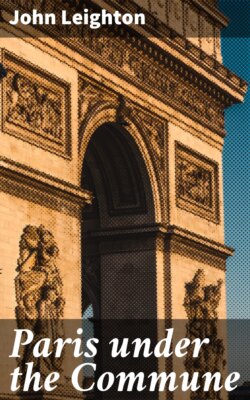Читать книгу Paris under the Commune - John Leighton - Страница 16
На сайте Литреса книга снята с продажи.
FOOTNOTES:
Оглавление[Footnote 5: Appendix, note 2.]
[Footnote 6: A mark of insult.]
[Footnote 7: This useless artillery was much ridiculed; jokers said that the notary of General Trochu was working out faithfully the "plan" of his illustrious client in these tardy fortifications.]
[Footnote 8: How was the Government to act in the presence of these facts; to await events, or to strike a great blow?
Some think that the resistance of the insurgents was strengthened by the measures taken by Government, which ought to have been more diplomatic and skilful. The agitation of these men of Montmartre, at the entry of the Prussians, had calmed down in a few hours; it was now the duty of Government to allay the irritation which had caused the insurgents to form their Montmartre stronghold, and not to follow the advice of infuriated reactionaries, who make no allowance for events and circumstances, neither analysing the elements of that which they are combating, nor weighing the measures they do not even know how to apply with tact.
The guns had not been re-taken, but Paris was very calm. Dissensions had broken out in the Montmartre Committee, some of whose members wished the cannon to be returned (the Committee sat at No, 8 of the Rue des Rosiers, with a court-martial on one hand, and military head-quarters on the other). Danger seemed now to be averted, and the authorities had but one thing to do, to allow all agitation to die out, without listening to blind or treacherous counsellors, who advocated a system of immediate repression. It was said, however, that the greater number of the members of Government were inclined to temporise, but the provisional appointment of General Valentin to the direction of the Prefecture of Police, seemed to contradict this assertion.
During this time, the leaders who held Montmartre, spurred on by the ambitious around them, and by those desirous of kindling civil war for the sake of the illicit gains to be obtained from it, were getting up a manifestation, which was to claim for the National Guard the right of electing its commander-in-chief; and the post was to be offered to Menotti Garibaldi. But though the men of Montmartre declared that all who did not sign the manifestos were traitors, yet the addresses remained almost entirely blank. The insurrection had evidently few supporters. According to others, the insurrection of 1871 was the result of a vast conspiracy, planned and nurtured under the influence of a six months' siege. No simple Paris émeute, but a grand social movement, organised by the great and universal revolutionary power; the Société Internationale, Garibaldiism, Mazziniism, and Fenianism, have given each other rendezvous in Paris. Cluseret, the American; Frankel, the Prussian; Dombrowski, the Russian; Brunswick, the Lithuanian; Romanelli, the Italian; Okolowitz, the Pole; Spillthorn, the Belgian; and La Cécilia, Wroblewski, Wenzel, Hertzfel, Bozyski, Syneck, Prolowitz, and a hundred others, equally illustrious, brought together from every quarter of the globe; such were these ardent conspirators, all imbued, like their colleagues the Flourens, the Eudes, the Henrys, the Duvals, and tutti quanti, with the principles of the French school of democracy and socialism.
This strong and terrible band, we are told, is under the command of a chief who remains hidden and mute, while ostensibly it obeys the Pyats, Delescluzes, and Rocheforts, politicians, who not being generals, never condescend to fight.
In the first days of March all was prepared for a coming explosion, and in spite of the departure of the Prussians, the Socialist party determined that it should take place. (Guerre des Communeux, p. 61.)]
[Footnote 9: A sign that they refused to fight.]
[Footnote 10: A smooth-bore musket arranged as breech-loader, and called a snuff-box, from the manner of opening the breech to adjust the charge.]
